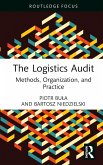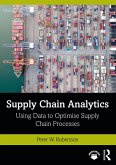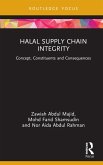Piotr Bula (Poland Cracow University of Economics), Bartosz Niedzielski (Poland Cracow University of Economics)
The Logistics Audit
Methods, Organization, and Practice
Piotr Bula (Poland Cracow University of Economics), Bartosz Niedzielski (Poland Cracow University of Economics)
The Logistics Audit
Methods, Organization, and Practice
- Broschiertes Buch
- Merkliste
- Auf die Merkliste
- Bewerten Bewerten
- Teilen
- Produkt teilen
- Produkterinnerung
- Produkterinnerung
This book explores the development, methods and impact of logistics audits on organizations.
Andere Kunden interessierten sich auch für
![The Logistics Audit The Logistics Audit]() Piotr Bula (Poland Cracow University of Economics)The Logistics Audit68,99 €
Piotr Bula (Poland Cracow University of Economics)The Logistics Audit68,99 €![The Negotiation Handbook The Negotiation Handbook]() Andrea CordellThe Negotiation Handbook40,99 €
Andrea CordellThe Negotiation Handbook40,99 €![Supply Chains in Reverse Logistics Supply Chains in Reverse Logistics]() Robert StanislawskiSupply Chains in Reverse Logistics55,99 €
Robert StanislawskiSupply Chains in Reverse Logistics55,99 €![Supply Chain Analytics Supply Chain Analytics]() Peter W. RobertsonSupply Chain Analytics51,99 €
Peter W. RobertsonSupply Chain Analytics51,99 €![The Gardener of Governance The Gardener of Governance]() Rainer LenzThe Gardener of Governance70,99 €
Rainer LenzThe Gardener of Governance70,99 €![Halal Supply Chain Integrity Halal Supply Chain Integrity]() Zawiah Abdul Majid (Malaysia Universiti Kuala Lumpur)Halal Supply Chain Integrity30,99 €
Zawiah Abdul Majid (Malaysia Universiti Kuala Lumpur)Halal Supply Chain Integrity30,99 €![Halal Supply Chain Integrity Halal Supply Chain Integrity]() Zawiah Abdul Majid (Malaysia Universiti Kuala Lumpur)Halal Supply Chain Integrity63,99 €
Zawiah Abdul Majid (Malaysia Universiti Kuala Lumpur)Halal Supply Chain Integrity63,99 €-
-
-
This book explores the development, methods and impact of logistics audits on organizations.
Hinweis: Dieser Artikel kann nur an eine deutsche Lieferadresse ausgeliefert werden.
Hinweis: Dieser Artikel kann nur an eine deutsche Lieferadresse ausgeliefert werden.
Produktdetails
- Produktdetails
- Routledge Focus on Business and Management
- Verlag: Taylor & Francis Ltd
- Seitenzahl: 144
- Erscheinungstermin: 9. Oktober 2024
- Englisch
- Abmessung: 216mm x 140mm x 8mm
- Gewicht: 200g
- ISBN-13: 9781032461274
- ISBN-10: 1032461276
- Artikelnr.: 71547466
- Herstellerkennzeichnung
- Libri GmbH
- Europaallee 1
- 36244 Bad Hersfeld
- gpsr@libri.de
- Routledge Focus on Business and Management
- Verlag: Taylor & Francis Ltd
- Seitenzahl: 144
- Erscheinungstermin: 9. Oktober 2024
- Englisch
- Abmessung: 216mm x 140mm x 8mm
- Gewicht: 200g
- ISBN-13: 9781032461274
- ISBN-10: 1032461276
- Artikelnr.: 71547466
- Herstellerkennzeichnung
- Libri GmbH
- Europaallee 1
- 36244 Bad Hersfeld
- gpsr@libri.de
Piotr Büa is an Associate Professor and Head of the International Management Department at Krakow University of Economics (KUE), Poland, Vice-Rector for Projects and Cooperation (KUE), former Director of Cracow School of Business (CUE), Senior Research Professor in Business Management Department at the University of Johannesburg, South Africa, and Grand Valley State University scholarship holder. He is the author or co-author of more than 175 publications in economics and management. His research interests focus on aspects related to the application of artificial intelligence and neuromanagement, risk management, internal audit, international management, and logistics. A member of international organizations associating professors and business practitioners in the management area: EFMD, CEEMAN, IMDA, GBATA, EIBA, GSSI, IAMB, EECSA, SAIMS. Bartosz Niedzielski is an Assistant Professor at Krakow University of Economics, Poland. He studied and conducted scientific activities, among other subjects, at the University of Greenwich (UK), University of Oxford (UK), London School of Economics (UK), Deggendorf Institute of Technology (DE), and Jagiellonian University (PL). He has over ten years of professional experience gained in global corporations in the BPO/SCC sector (mainly at HSBC). His research interests focus on aspects related to the application of artificial intelligence in organizations, management, and internal audit. He is the author or co-author of more than 50 scientific publications in economics and management, including the monograph entitled Management, Organizations and Artificial Intelligence: Where Theory Meets Practice (Routledge, 2021).
Acknowledgments
Introduction
Chapter 1. Audit: a theoretical approach
1.1. Audit - definitions, types, objectives, mission
1.2. External audit vs. internal audit - similarities and differences
1.3. Evolution of internal audit against the background of audit generation
1.4. Internal audit and controlling - a comparative analysis
1.5. Internal auditor - role, tasks, standards, work
1.6. Control and analytical questions
Chapter 2. Logistics audit: a classical approach
2.1. The enterprise logistics system - definitions, types, treatments
2.2. Logistics audit, as an example of an industry audit
2.3. Logistic audit - organization, stages, procedures
2.4. Problem areas of the logistics audit
2.5. Logistics audit in the era of Industry 4.0
2.6. Control and analytical questions
Chapter 3. Logistics audit: a modular approach
3.1. Logistics audit of procurement
3.2. Logistics audit of production
3.3. The logistics audit of the warehouse
3.4. Logistics audit of distribution
3.5. Logistics audit of the supply chain
3.6. Control and analytical questions
Chapter 4. Logistics audit: a management approach
4.1. Audit - a tool for improving the organization
4.2. Logistics audit in the organization - analysis of the logistics system
potential
4.3. Logistics audit in the organization - identification of risks in
logistics processes
4.4. The impact of digitalization on the logistics audit
4.5. The current Polish and European market for logistics audit services
4.6. Control and analytical questions
Conclusion
Bibliography
Introduction
Chapter 1. Audit: a theoretical approach
1.1. Audit - definitions, types, objectives, mission
1.2. External audit vs. internal audit - similarities and differences
1.3. Evolution of internal audit against the background of audit generation
1.4. Internal audit and controlling - a comparative analysis
1.5. Internal auditor - role, tasks, standards, work
1.6. Control and analytical questions
Chapter 2. Logistics audit: a classical approach
2.1. The enterprise logistics system - definitions, types, treatments
2.2. Logistics audit, as an example of an industry audit
2.3. Logistic audit - organization, stages, procedures
2.4. Problem areas of the logistics audit
2.5. Logistics audit in the era of Industry 4.0
2.6. Control and analytical questions
Chapter 3. Logistics audit: a modular approach
3.1. Logistics audit of procurement
3.2. Logistics audit of production
3.3. The logistics audit of the warehouse
3.4. Logistics audit of distribution
3.5. Logistics audit of the supply chain
3.6. Control and analytical questions
Chapter 4. Logistics audit: a management approach
4.1. Audit - a tool for improving the organization
4.2. Logistics audit in the organization - analysis of the logistics system
potential
4.3. Logistics audit in the organization - identification of risks in
logistics processes
4.4. The impact of digitalization on the logistics audit
4.5. The current Polish and European market for logistics audit services
4.6. Control and analytical questions
Conclusion
Bibliography
Acknowledgments
Introduction
Chapter 1. Audit: a theoretical approach
1.1. Audit - definitions, types, objectives, mission
1.2. External audit vs. internal audit - similarities and differences
1.3. Evolution of internal audit against the background of audit generation
1.4. Internal audit and controlling - a comparative analysis
1.5. Internal auditor - role, tasks, standards, work
1.6. Control and analytical questions
Chapter 2. Logistics audit: a classical approach
2.1. The enterprise logistics system - definitions, types, treatments
2.2. Logistics audit, as an example of an industry audit
2.3. Logistic audit - organization, stages, procedures
2.4. Problem areas of the logistics audit
2.5. Logistics audit in the era of Industry 4.0
2.6. Control and analytical questions
Chapter 3. Logistics audit: a modular approach
3.1. Logistics audit of procurement
3.2. Logistics audit of production
3.3. The logistics audit of the warehouse
3.4. Logistics audit of distribution
3.5. Logistics audit of the supply chain
3.6. Control and analytical questions
Chapter 4. Logistics audit: a management approach
4.1. Audit - a tool for improving the organization
4.2. Logistics audit in the organization - analysis of the logistics system
potential
4.3. Logistics audit in the organization - identification of risks in
logistics processes
4.4. The impact of digitalization on the logistics audit
4.5. The current Polish and European market for logistics audit services
4.6. Control and analytical questions
Conclusion
Bibliography
Introduction
Chapter 1. Audit: a theoretical approach
1.1. Audit - definitions, types, objectives, mission
1.2. External audit vs. internal audit - similarities and differences
1.3. Evolution of internal audit against the background of audit generation
1.4. Internal audit and controlling - a comparative analysis
1.5. Internal auditor - role, tasks, standards, work
1.6. Control and analytical questions
Chapter 2. Logistics audit: a classical approach
2.1. The enterprise logistics system - definitions, types, treatments
2.2. Logistics audit, as an example of an industry audit
2.3. Logistic audit - organization, stages, procedures
2.4. Problem areas of the logistics audit
2.5. Logistics audit in the era of Industry 4.0
2.6. Control and analytical questions
Chapter 3. Logistics audit: a modular approach
3.1. Logistics audit of procurement
3.2. Logistics audit of production
3.3. The logistics audit of the warehouse
3.4. Logistics audit of distribution
3.5. Logistics audit of the supply chain
3.6. Control and analytical questions
Chapter 4. Logistics audit: a management approach
4.1. Audit - a tool for improving the organization
4.2. Logistics audit in the organization - analysis of the logistics system
potential
4.3. Logistics audit in the organization - identification of risks in
logistics processes
4.4. The impact of digitalization on the logistics audit
4.5. The current Polish and European market for logistics audit services
4.6. Control and analytical questions
Conclusion
Bibliography









